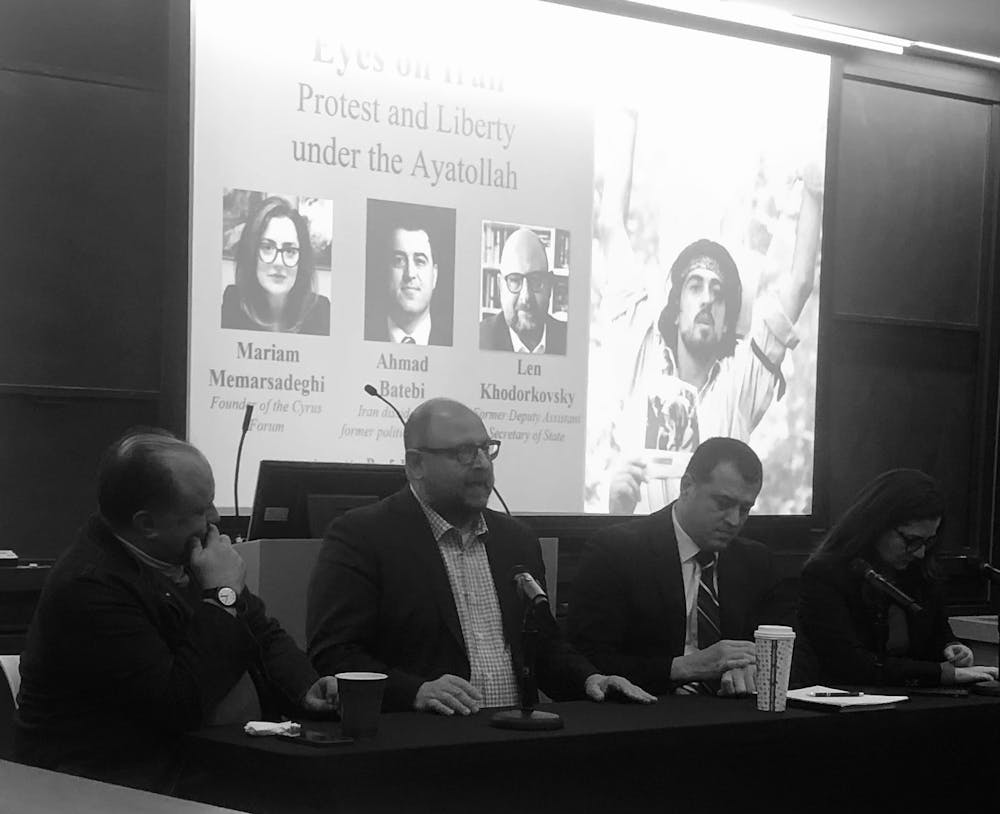At a campus event hosted by The Princeton Tory this month, panelist Mariam Memarsadeghi, an Iranian activist advocating for regime change in Iran, accused Chair and Professor of Near Eastern Studies Behrooz Ghamari-Tabrizi of being “very close to the Iranian regime” — accusations that Ghamari-Tabrizi rejected in an interview with The Daily Princetonian.
The event hosted by the Tory took place on Dec. 1 and was titled “Eyes on Iran, Protest and Liberty Under the Ayatollah.”
Other panelists included Ahmad Batabi, a former Iranian political prisoner, and Len Khodorkovsky, a former Deputy Assistant Secretary of State in the U.S. Department of State. Memarsadeghi is the founder of the Cyrus Forum. The event was moderated by Professor Barnard Haykel from the Department of Near Eastern Studies.
Ghamari-Tabrizi told the ‘Prince’ that he felt that the event was a planned attack on him from the start.
“This is not about my scholarship,” he said. “Memarsageghi wanted to attack my being.”
He also voiced objections to Haykel’s moderation of the event as a fellow faculty member.
“I am shocked that a colleague in my department sat there and listened to it without objecting to that conversation,” he said.
In an email to the ‘Prince,’ Haykel wrote, “I had no idea that my colleague’s statements and views would come up and had no basis for engaging the speaker about them nor did I want to. I also didn’t see the relevance of these statements to what is happening in Iran in terms of political and social unrest, which is what I wanted the audience to hear and learn about.”

Still, he said in the email, “I am not in the habit of stopping or silencing conversation since this runs against the culture of academic freedom.”
Haykel also cited University regulations as a constraining factor on his moderation of the event.
“I could not have stopped Ms. Mariam Memarsidaghi from speaking. She was a guest speaker on campus and has the right to voice her opinion. Had I stopped her, I would have been in violation of Princeton’s Rights, Rules, Responsibilities section 1.1.3, which protects the speech of faculty, students and guests on campus,” he continued.
Panelists touched on the dynamics in the Middle East, the terrorist actions of the Iranian regime, and the United States’ response.

Memarsadeghi criticized the Biden administration for what she called its “appeasement posture,” and argued that “people in elite institutions like Princeton University who support this set of ideas” is behind the White House’s approach.
Memarsadeghi alleged that Ghamari-Tabrizi participated in the 1979 revolution, referring to the Iranian American hostage crisis in 1979 when 50 Americans were held captive for 444 days.
“He boasts about the fact that he knows at least half of the hostage takers,” she said.
“This is a very coveted position. Bernard Lewis used to teach in that seat,” she said of Ghamari-Tabrizi’s professorship.
Lewis was a Professor Emeritus of Near Eastern Studies at Princeton and a public intellectual whose counsel on foreign policy in the Middle East was frequently sought by American neoconservative politicians, including by the Bush administration in the wake of the Sept. 11, 2001 attacks. Lewis died in 2018.
Ghamari-Tabrizi referred to Memarsadeghi’s tweet before the event as evidence for the notion that her intention at the event was to make it into a personal attack.
“She says she is going to Princeton to expose the Islamic regime’s infiltrators on Princeton campus,” Ghamari-Tabrizi said, describing the tweet. “She presents the event as an exposé.”
To Memarsadeghi’s allegation of “boasting” about his acquaintance with the hostage takers, Ghamari-Tabrizi said, “Okay, I knew students who took over the American embassy, so what is the point? Am I responsible for who took over the embassy?”
Ghamari-Tabrizi added that his books are also translated into Farsi and he has been to events related to his books in Iran.
“Do I participate in conversations in Iran?” he said, “Yes, I do, and I don’t see anything wrong with that.”
He emphasized that his statements are from a scholarly point of view and don’t express his political opinions: “One is to understand how they justify their action and that’s what the scholarship is all about.”
On the regime, Ghamari-Tabrizi said that he “disagree[s] with their rationale.” He added, “The fact that I said the Iranian government is not a crazy actor is because they are very pragmatic in sustaining themselves.”
“The Iranian situation is not an instance of a repressive regime that is so exceptional in the world that people rise against it. However, the Iranian people are exceptionally revolutionary subjects,” he said.
Kayra Sener is a news contributor for the ‘Prince.’ Please send any corrections to corrections[at]dailyprincetonian.com.








